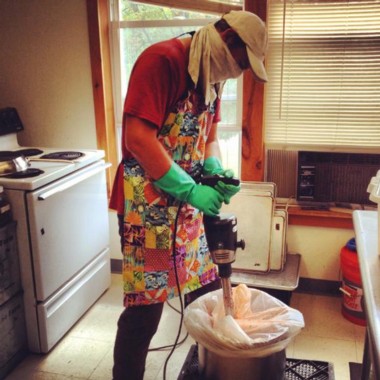There’s nothing quite like the electric (entirely natural) red of a bottle of Huy Fong’s Sriracha sauce. Even smelling the stuff can make your mouth water. Something about its combo of fiery chili, deep garlic, salt and je ne sais quoi is exactly right, and has become indispensable to many a palate. It’s not, many a critic claims, exactly like the sauce you’ll find in the Thai city of Si Racha, which Huy Fong founder David Tran named it for. The original is reportedly thinner, sweeter, and milder. But authenticity be hanged—Huy Fong is seriously tasty stuff like nothing else.
It seems like a simple enough combination of ingredients. However, if you want to whip up your own version of this exceptionally delicious condiment, Kitchen Garden Farm’s Tim Wilcox says, “It’s not hard. But it’s sort of dangerous.”
Yep, dangerous.
Turns out that massive quantities of pureed hot peppers release something along the lines of a toxic airborne event. It’s so bad that in October, the city of Irwindale, Calif., just east of L.A., filed suit against Huy Fong. The city is the site of the company’s new factory, and the neighbors haven’t cottoned to the spice in the air. The Los Angeles Times reports that “in Irwindale, where the hot sauce’s production facilities are, residents are complaining of burning eyes, irritated throats and headaches caused by a powerful, painful odor that the city says appears to be emanating from the factory during production.”
That’s dark news indeed: the legal action may force Huy Fong Foods to cease production in Irwindale, at least until the issues are resolved. Irwindale seems to have little sympathy for the massive numbers of spice fans who can no longer function without regular hits of sriracha.
The Serious Eats website has already undertaken the melancholy work of finding an adequate replacement if necessary, but there is a better route for Valley residents: Sunderland’s Kitchen Garden Farm, using locally grown peppers, now sells its own version of sriracha. Hard to imagine how that news could get better.
Caroline Pam (former Advocate food critic) and Tim Wilcox, owners of Kitchen Garden Farm, offer an annual Chilifest, and several homegrown products have emerged from that colorful event and from Wilcox’s love for peppers. They’ve done salsas, and they offer a habanero sauce that’s a stunner in the best peppery tradition, very hot but not just hot, delivering satisfying flavors with the burn.
So when Wilcox saw a video online exploring homemade versions of the distinctive rooster-emblazoned Tran creation, he says he had a moment of realization: “I said, ‘Duh! I grow this stuff!’”
Kitchen Garden had access to a kitchen that could handle the toxic task, so Wilcox and Pam set out to offer the sauce at their Chilifest. Wilcox says it costs a lot to produce, but so far, the Valley’s many lovers of hot food and local food have proven willing to support homegrown production.
Wilcox explains that what’s distinctive about the sauce is that it’s primarily pureed chilis, not vinegar. Grinding them up, he quickly discovered, required a respirator mask, not to mention a very big immersion blender. After the ingredients are combined, the sauce is left to ferment for a few days. It’s then boiled to stop fermentation and bottled.
A taste test raises an inevitable question: should a sriracha-style sauce replicate Tran’s original, or aim for something different? It’s a tough question to answer—Huy Fong’s sauce has become widely known, and hardcore fans don’t want something different. But a homegrown version seems like it ought to be distinguished by more than a different label.
In the case of Kitchen Garden, a sniff of the bottle reveals a similarly mouth-watering blast of pepper and garlic. A head-to-head matchup puts the two neck and neck. Taste a spoonful of each in turn, and differences reveal themselves. Where Huy Fong commands a depth of flavor and slow heat buildup, Kitchen Garden offers a bright freshness and a more pronounced sweetness.
Regardless, they’re close cousins. Kitchen Garden’s sauce doesn’t seem so much a replacement for the iconic original as a wonderfully tasty additional choice in an era when the fashionabililty of hot flavors is at a high water mark.
“It speaks to hipster cool,” says Pam. “Hot sauce is one of the 10 fastest-growing industries.”
For now, you’ll only find Kitchen Garden sriracha at area farmers’ markets, including the winter markets in Amherst, Northampton and Greenfield. Pam and Wilcox offer a hard-to-match combo: the pair have stellar bona fides (Pam’s a former journalist who trained at the French Culinary Institute, and Wilcox is an experienced farmer who studied food anthropology at Hampshire College), and their sriracha is a great distillation of Valley flavors you can’t find anywhere else.•



